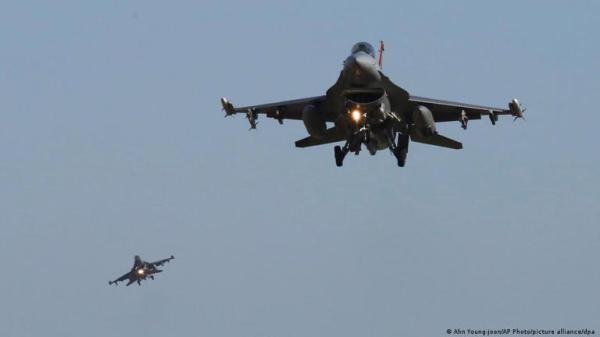
The Federal Government has announced plans to bolster its anti-banditry operations with the acquisition of 50 new aircraft scheduled to arrive between now and next year.
The initiative aims to strengthen security efforts in the North-West region and across Nigeria as terrorists occupied the Kainji National Park in Niger State.
The Chief of Air Staff, Marshal Bala Abubakar, disclosed on Wednesday that the air fleet would include 12 AH-1 attack helicopters, 24 M-346 attack aircraft, 12 Augusta Westland 109 helicopters and two Casa 295 medium airlift aircraft.
Abubakar stated this during the inauguration of new facilities at the 213 Forward Operational Base in Katsina State.
The facilities include a taxiway link, two aircraft hangars, operation and engineering buildings, a perimeter fence and a football pitch.
Expressing gratitude to the federal and state governments for their support in combating banditry, the air chief praised NAF personnel for their dedication to maintaining peace and security in the region.
He said, “We are also mindful that the remnants of insurgents from Borno and Yobe states would be considering the option of moving back to Adamawa through the border towns in this regard, the Nigerian Air Force is intensifying its inner surveillance with a view to taking a decisive military action when required to prevent the re-emergence of insurgents activities in the state.
“Let me use this opportunity to inform your excellency that the Nigerian Air Force is expecting 50 brand new aircraft in its inventory in the next one and a half to two years. And I intend to station some of them right here in Yola.”
Also on Thursday, the Chief of Army Staff, Lt. Gen. Taoreed Lagbaja, received two newly acquired helicopters at the Nnamdi Azikiwe International Airport in Abuja.
The two new Bell UH-1H helicopters touched down in the country at about 4:30 pm.
The two helicopters are meant to be used for logistics, surveillance, training and casualty evacuation among others.
Lagbaja said, “We are on a learning curve in the aviation business. We hope it will be a pleasant experience that will give our troops flexibility in the field and enhance our operational successes.
“The Nigerian Army is poised to serve the nation better with the acquisition of these platforms. We shall overcome and give our people the enabling environment for economic prosperity. ”
Lagbaja noted that the Army had nurtured the desire to have an aviation wing since 1984, expressing delight that the dream had finally materialised with the acquisition of the two helicopters.
He said, “Aviation has always been a game-changer, and that informs the decision for the Nigerian Army to strive to acquire platforms towards the actualisation of the dream of having an army aviation arm since 1984.
“Today that dream has been actualised. We expect that the support that will be provided to the troops in the field with the acquisition of this utility helicopter, in terms of casualty evacuation, and the supply and insertion of troops in critical areas, will have greater flexibility and improve operational efficiency in the field. “
The Coordinator, Nigerian Army Aviation, Brig. Gen. M.S. Alkali said the helicopters would strengthen the Army’s reconnaissance, surveillance, and air mobility capabilities.
“As we integrate these platforms into our operations, let us also remember that the true strength of our aviation lies in the skilled and courageous personnel who operate and maintain these machines. Their professionalism, dedication, and expertise are the bedrock upon which our success is built,” he said.
In a new report released on Wednesday, the Clingendael Institute, a Dutch think tank, said there was ample evidence that Islamist terrorists from the Sahel region had crossed into Nigeria through the Benin Republic border.
The jihad fighters were said to have settled in Kebbi State and the Kainji National Park, turning the facility into their base.
Reacting to the report, the Director, Defence Media Operations, Maj. Gen. Edward Buba, said the military was not slowing down in its campaign against terrorists across the country.
He noted that the objective of the military operations across the country was to destroy the terrorists wherever they were.
Buba said, “The military is fighting the terrorists wherever they exist across the country. Indeed, troops of Operation Whirl Punch are conducting operations in terrorist enclaves in North Central which includes Kainji Lake Park.
“Additionally, troops of Operation Hadarin Daji are equally doing the same to terrorists in Kebbi State and the west of the country. The objective of our operations is to destroy these terrorists and dismantle their military capabilities so citizens are safe and protected.”
The Niger State Commissioner for Homeland Security, Muhammed Bello, could not be reached for comments on Thursday, as calls to his phone indicated it was switched off.
A director in the ministry, Dagash Ismail, declined to comment on the presence of ISWAP and other terrorist groups in the state.
The report said the extremists’ motive for settling in Kainji Lake National Park and Kebbi state was unclear.
They were believed to be affiliated with the various jihadist groups with links to Boko Haram.
The report said, “Violent extremists are present in Kainji Lake National Park just across the border from the Borgou Department. Evidence suggests this involves Sahelian extremists (likely Jama’a Nusrat ul-Islam wa al-Muslimin). Another group would be Darul Salam – a group linked to Boko Haram, if not fully affiliated – with an open attitude towards bandits.
“There has been a strong increase in the movement of unidentified armed actors along the Borgou border with Niger State and in banditry-related incidents since March 2023. The evidence suggests that there is a direct link with those operating in Kainji Lake National Park.’’
It added, “Since March 2023, unidentified armed groups have had a concealed presence in the Forêt de Trois Rivières between southern Alibori and the Borgou Department.’’
The border region between Nigeria, Niger and Burkina Faso had been identified as a hotspot for insurgency activities with various terrorist groups like Al Qaeda and the Islamic State using the region as a staging area to launch attacks on government forces and civilians.
The Clingendael Institute said banditry was re-emerging in zones controlled by the JNIM in Benin, noting that the bandits appeared to have Nigerian connections.
The report warned that the jihadists might threaten the well-developed cross-border trade system between the Nigerian and Beninese border.
“This system generates livelihoods for many people in the area. Livelihoods are at risk. There is a variety of markets and crossings connecting North West Nigeria and Northern Benin. Unidentified armed groups and Darul Salam operate in these hubs.
“People’s livelihoods are highly dependent on cross-border trade. Interviews revealed frustration and a strong sense of grievance towards both Nigerian and Beninese government policies that are perceived to put livelihoods under stress,’’ it further noted.
The report mentioned that the reported ban on cereal exports and soybeans, accompanying border restrictions and fuel subsidy removal in Nigeria hurt livelihoods in the border area.
It noted, “Not only are there numerous indications of extremist activities and a link between bandits and extremists along the border but also there are clear social links that facilitate cross-border exchange and real livelihood needs that create vulnerabilities to recruitment. The governments of Benin and Nigeria urgently need to move into action.’’
The institute advised the government to step up military response by revamping regional security cooperation within the Economic Community of West African States through bilateral security cooperation for ‘’hot-pursuit, intelligence sharing and coordination; and a joint strategy for cross-border hunting groups.’’
It also recommended prioritising people’s livelihoods by cushioning the impact of the ban on cereals and fuel subsidy withdrawal to reduce vulnerability to recruitment.
The Dutch organisation further advised the government to respond rapidly to changing contexts by closely monitoring border markets for sudden vulnerabilities.
Meanwhile, the communities surrounding Kainji Park have been deserted following the occupation of the facility located in New Bussa, Borgu Local Government Area, by the terrorists and bandits.
It was gathered that the national park, which is the third largest park in the country, has become a no-go area for both the locals and staff of the park.
All the workers were said to have abandoned the facility for the terrorists who were engaged in illegal mining and logging.
Estimated to be about 1,000 men, the insurgents were said to live in the forest and rocks in the Kainji Park from where they terrorise the surrounding communities.
A resident of Gbenji community in Borgu, who declined to identify himself, explained that he relocated to Minna, the state capital, for his safety.
He revealed that hundreds of people had been killed by the extremists, noting that dozens of others were abducted and languishing in their captors’ den.
He stated, “New Bussa in Borgu LGA where the National Park is located has become a ghost land. The terrorists and bandits have taken over the place.
“The Islamic State of West Africa Province militants are engaged in illegal mining and logging activities while the bandits are killing people and kidnapping victims for ransom.
“The ISWAP members came with their wives and children and have settled in the area and doing their business. We, the owners of the place, have fled for our lives and the state and security agencies cannot help us.
“As I speak with you, a lot of our people are in Internally Displaced Persons’ Camps and have no hope of returning to their ancestral homes.”
A resident of Dekara community, who identified himself simply as Musa, said he and his family were forced to flee their community in 2023 after ISWAP militants attacked the area.
Musa, who has lived in an IDP camp for two years, insisted that life in the camp was far better than in his community which he said was under the control of terrorists.
Recalling his ordeal, Musa noted, “We fled in 2023 when the ISWAP invaded our community. We had no option because they allowed us to flee. In this camp alone, we have more than 700 people from various communities in Borgu just like there are thousands more in other IDPs.’’
Musa was not sure the authorities could reclaim the communities under ISWAP control, saying, “I don’t think that the government will ever reclaim those lands. There was no security in the LGA and so, the terrorists were operating as if they were the ones in charge of the LGA.
“They were doing lucrative business of mining and felling of timbers and selling them in neighbouring Benin Republic.”
Commenting on the situation, the lawmaker representing Gurara/Suleja/Tafa Federal Constituency, Niger State, in the House of Representatives, Adamu Tanko, described the development as disturbing.
However, he assured that the federal and state governments were doing their best to dislodge the jihadists, whom he said took advantage of the Sahel route.
Tanko noted, “There is a direct route from the Sahel to Nigeria through Sokoto, Kebbi and Niger States. They are taking advantage of this route to come into the country to perpetuate their evil agenda.
“You know Niger State has about the largest landmass in the country and this makes it challenging to arrest some of these elements.
“We are aware of the activities of these bandits or jihadists. It is a disturbing development because it affects the lives of the people.’’
Asked about the number of Niger communities under the control of bandits and jihadists, the lawmaker said, ‘’In terms of statistics, only the state government can provide that. But the governments (state and federal) are doing their best to run these people out of our state.
‘’We believe the government will succeed in its effort because the current government has been doing very well, recording successes against the criminal elements.’’






















